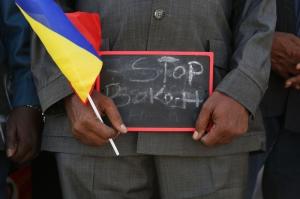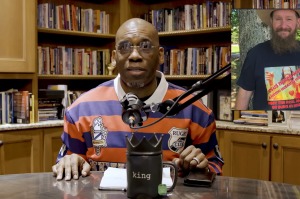Evangelist Ray Comfort Says Blacks 'Too Smart' for Atheist Agenda
Atheist groups are targeting African-American communities by asking them to think about leaving their church during Black History Month – but a number of pastors and scholars are saying that is not going to happen any time soon.
National ad campaigns launched by atheist organizations have been growing in regularity in the U.S., but a new initiative by African-Americans for Humanism (AAH) is targeting black Americans in particular who have historically been strongly linked with religion.
"A lot of people think there's one black experience. A lot of people think that if someone's black it means that they're religious. So we want to be able to show people that that's not true, that there are non-religious people out there," said Debbie Goddard, director of AAH, referring to the billboards asking "Doubts about religion? You're one of many." The billboards feature images of famous historical black freethinkers alongside photos of a contemporary black atheist leader.
The ads have been strategically placed for the start of Black History month, which is in February.
Ray Comfort, international evangelist and author of Hitler, God, and the Bible, as well as the anti-abortion short film "180," claims that African-Americans are staying in churches not because of social pressures, but because they are "too smart" to accept the atheistic worldview.
In Hitler, God, and the Bible, Comfort exposes Adolf Hitler's theology and abuse of religion as a means to seize political power and ultimately instigate World War II and genocide.
"Atheistic evolution isn't an intelligent belief, as atheists would have the black community believe," the evangelist said of AAH's campaign, according to WND.com.
Comfort added, "It's a philosophy for the dumbest of the dumb, and it's an insult to the black heritage to try and hoodwink them into believing that nothing created everything.
"That's a scientific impossibility, and African-Americans have got too much intelligence to believe such an insane worldview. That's why there are so few black atheists. Most atheists are white, educated, and greatly lacking when it comes to common sense."
Besides confronting pro-abortion views, Comfort has also butted heads with some prominent atheists in the past, including world-famous professor Richard Dawkins.
Dawkins received a DVD copy of the "180" film signed by Comfort, in which the author wrote in an attached note that he wanted to hear the professor's "thorts" on the film.
The professor then made a 50-second YouTube video holding the DVD cover to the camera and mocking the author for his misspelling, but Comfort retaliated by claiming that he is aware of his spelling and that it was intentional.
There has been mixed response from African-American church leaders who have seen AAH's billboards, which will be featured in New York City, Chicago, Atlanta, Los Angeles, Dallas, Washington, D.C., and Durham, N.C.
"Traditionally African-Americans come out of a tradition that is led and motivated by faith. We are where we are and we are who we are primarily because we've chosen to believe in a power that's bigger than ourselves," Pastor David Lane of Marsalis Avenue Church of Christ said, according to The Blaze. He shared that he realizes the posters might stir up some discussion in the community, but is not too worried about the fate of his congregation.
While Lane expresses optimism, some pastors appear more apprehensive about the atheist campaign.
"It's a direct confrontation to the church. Absolutely," said Pastor Kyev Tatum to CBS19.com in regards to the billboards appearing in south Oak Cliff within a mile of about a dozen black churches in Chicago.
"We want people to just ignore the billboard signs. We're asking people and pastors not to get excited about the billboard signs," he continued. "They're trying to get people to be members of their organization and the way they think, and I think we are giving them too much attention."
The Root magazine featured an interview late last year with Eddie S. Glaude Jr., the William S. Tod Professor of Religion and chair of the Center for African American Studies at Princeton University, who offered his views on the importance the church plays in African-American culture.
"Religion has played a significant role in the formation of African-American cultural life," Glaude Jr. said. "It has played a central role in the formation of African-American institutional life and has provided extraordinary resources in the personal lives of many African-Americans."
"To ask whether religion is beneficial or a problem for people is really a question that is a vestige of secular skepticism; I don't think it's a question that bears an answer. Religion does the kinds of work that it does," the professor offered.
A study called "A Decade of Change In American Congregations" by Faithcommunities.org focusing on the period between 2000 and 2010 found that African-American church attendance has been on the rise in some key areas.
Black congregations had the highest percentage of attendance growth of more than 10 percent for over a five-year period – 48.9 percent of churches reported such a growth, which is higher than both white churches and all other groups. More black churches (20.9 percent) also had congregations where young adults made up for more than 20 percent of members, which was significantly higher than white churches at 12. 9 percent.



























